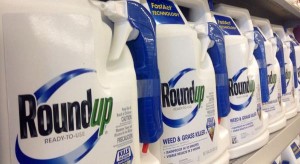Avrupa Parlementosundan glifosata yeşil ışık, özel ve toplum içerisinde kullanımı yasaklamaya destek.
Avrupa Parlementosu, tartışmalı tarım ilacı glifosatın maksimum yedi sene daha kullanılmasına izin verdi. Hayvanları Koruma Partisi’nin önerdiği toptan yasak önergesine yakın olmasa da, Avrupa Komitesi’nin önerdiği 15 seneden daha az. Avrupa Parlementeri Anja Hazekamp “Avrupa Parlementosu’nun Mosanto gibi uluslararası devlerin kârını, halk ve hayvan sağlığı ve çevrenin korunmasının önünde tutması hayal kırıklığı yarattı” diye belirtti.

Hazekamp “Bu zehir nerdeyse tarımın her alanında kullanılıyor ve her yerde karşımıza çıkıyor. Kamu ve hayvan sağlığını tehlikeye düşürdüğü için bu zehirin acilen pazardan çekilmesi gerekli.” Dedi. Hayvanları Koruma Partisi ve Groen Links’in bu ilacın özel kullanım ve park ve çocuk bahçeleri gibi kamu alanlarında kullanımının yasaklanmasına ilişkin önerisi Avrupa Parlementosu’nun desteğini aldı.
Glifosat dünyada en çok satılan tarım ilacı. İçindeki zehir bahçelerdeki otları yok etmeye yarayan bu ilaç tarım endüstrisinde çok büyük ölçüde kullanılmakta. Dünya Sağlık Örgütü geçtiğimiz sene bu zehirin kanserojen olabileceği konusunda uyardı. Bunun yanı sıra bu ilacın hormon dengelerini bozma ihtimali de oldukça yüksek. Ancak üretici Mosanto ve Avrupa Parlementosu bu zehirin kullanımında hiç bir sakınca olmadığını iddia ediyorlar. Bu nedenle Avrupa Komisyonu glifosatın kullanımına 15 sene daha izin verilmesi konusunda teklifte bulundu.
Hazekamp’a gore “Glifosatın yaygın kullanımı ve kanserojen etkisi çok tehlikeli bir birleşim. Tarım alanlarından nehirlere, oradan şehir suyuna ve de yiyeceklerimize karışıyor. Yapılan araştırmalarda Avrupa’da yaşayan insanların yarısının vücudunda glifosat izlerine rastlanmış. Bir çok insan bu konuda endişeli, Avrupa’lıların üçte ikisi glifosatın yasaklanmasını istiyor”.
Glifosat ile ilgili nihai karar 28 AB üyesi ülkenin kararını bekliyor. Mayıs ortasında bu kanserojen maddenin Avrupa’ya yeniden girip giremeyeceği konusunda sandığa gidecekler. Şimdiye kadar Fransa, İsveç, İtalya ve Hollanda glifosatın yeniden Avrupa’ya girmesine karşı olduklarını belirttiler. Ancak Devlet Bakanı Van Dam geçtiğimiz günlerde meclise ilettiği mektubunda, gerekli koşullar sağlandığı takdirde bu zehire yeniden izin verilmesi taraftarı olunduğunu belirtti.
The European Parliament has approved of the readmission of the controversial pesticide glyphosate for maximum seven years. That is shorter than the admission for fifteen years as was proposed by the European Commission. The Party for the Animals called for a total ban of glyphosate. “It is highly disappointing that the European Parliament finds the profits of multinationals such as Monsanto more important than our environment and the health of people and animals,” said MEP Anja Hazekamp.

“This pesticide is hard to avoid and must be taken off the market since the safety of people and animals cannot be guaranteed,” said Hazekamp. The proposals of the Party for the Animals and Green Left to ban private use and the use in public parks and playgrounds were supported in the European Parliament.
Glyphosate is the most sold pesticide in the world. The pesticide kills weed in gardens and is used on a large scale in agriculture. Last year, the World Health Organisation warned that the pesticide is most likely carcinogenic. Additionally, the pesticide may possibly be endocrine disruptors. But its producer Monsanto and the daily European government state that the pesticide is safe for use. The European Commission therefore made a proposal for the readmission of glyphosate for the maximum period of fifteen years.
“The widespread use and the carcinogenic effect of glyphosate are a dangerous combination. This pesticide is found in rivers, in ground water and in our food. Research has proved that half of all people in Europe have levels of glyphosate in their body. Many people are seriously concerned about it, as much as two-thirds of all Europeans want glyphosate to be banned,” according to Hazekamp.
The definitive decision about glyphosate lies with the 28 Member States of the European Union. They will vote on readmission of this cargogenic product in mid-May. France, Sweden, Italy and the Netherlands have objected to renewing the glyphosate admission until now. But State Secretary Van Dam recently informed the Lower House by letter that he wishes to agree to the readmission of the pesticide under certain conditions.